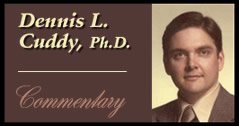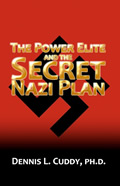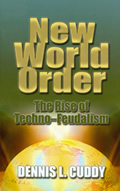THE DISARMAMENT OF AMERICA
PART 2
By
Dennis L. Cuddy, Ph.D.
January 23, 2012
NewsWithViews.com
In the Chicago Tribune article, “OWI Propaganda Machine Linked to Rhodes Men” (July 31, 1951), one reads that after the federal government’s Office of War Information broke up following World War II, many of its former employees went into other government departments, but most went into the radio and publishing fields, where “those who absorbed the [Elmer] Davis [head of OWI who had been a Rhodes scholar] training have pushed the British concept of policing the world with American soldiers and economic aid and have fought for a world federation under which the United States would surrender its sovereignty.” Then, a few weeks later in September 1951, the World Association of Parliamentarians for World Government (WAPWG) was founded (Clark’s 1958 co-author Lewis Sohn would be a legal consultant to the organization).
At WAPWG’s 1952 London meeting, it adopted a map showing that one of the places American soldiers would police under a world government would be Yugoslavia (Rhodes scholar, CFR member and Trilateralist, President Clinton, sent U.S. soldiers to Yugoslavia). The map also showed U.S. troops would be in Australia, and on November 16, 2011 BBC News reported that Australian Prime Minister Julia Gillard at a news conference with President Obama announced that Australia would host a full U.S. Marine task force of about 2500 personnel in the coming years. The WAPWG map further showed US armed forces would be in Kazak SSR (on September 14, 1997 U.S. troops began a joint exercise in Kazakhstan), among other places.
This same 1952 map also showed Russian soldiers in the world government would be policing in Oklahoma (just south of Kansas) southward and eastward in the U.S. And coincidentally, Russian soldiers were in Ft. Riley, Kansas in October 1995 in an exercise designed “to foster interoperability between the U.S. and Russian soldiers.” Similarly, former Soviet bloc countries’ soldiers were in exercises at Ft. Polk, Louisiana in August 1997. And Russian police have been in Southern towns like Beaumont, Mississippi (see The Beaumont, November 9, 1994), with one Russian officer even assisting in the arrest of 3 people in western North Carolina (see The Lincoln Gazette, March 12, 1995).
WAPWG’s world government was to be called the World Organization (WO) and it would “take over the existing facilities of the United Nations Organization.” According to its Charter, the WO would be “coordinating, and if necessary directing, the production and distribution of basic food stuffs, raw and strategic materials.” It would have a World Security Force but “personnel will abide for purposes of Military Law and discipline under their own national, union, or commonwealth codes until such time as it appears suitable for a standardization to take place…. All trade agreements between Governments and their plans for future development of basic needs will be coordinated by World Organization.
All of the information in Part 1 regarding the World Association of Parliamentarians for World Government (WAPWG), plus much more regarding WAPWG’s 1952 map showing what nation’s forces would be policing where, was included in a pamphlet distributed at the United World Federalists’ Annual Assembly, June 6-7, 1959. UWF members Mr. and Mrs. Alan Cranston were sponsors of the Annual Assembly, and Alan Cranston would later become a UWF President, a U.S. Senator, and Chairman of the Board of Directors of the Gorbachev Foundation/USA. In 1949, Cranston had wanted Congress to call for a national convention to amend the U.S. Constitution to “expedite and insure the participation of the United States in a federal world government.”
In 1953, S.Con.Res.32 “Favoring universal disarmament” was introduced with such sponsors as Senators Bricker, Kennedy, Mansfield, Morse and Fulbright. And in that same year, Grenville Clark and Louis Sohn wrote Detailed Proposals for Revision of the United Nations Charter. In 1954, the WAPWG and the World Movement for World Federal Government (WMWFG) issued Proposals for United Nations Charter Revision, which included making the UN into a world federal government from which no member could secede, totally disarming nations in stages, forming an International Police Force and an International Court of Justice (with compulsory jurisdiction), and enacting legislation for raising revenues from member nations proportionately (a UN conference later brought up the possibility of a global tax).
The WAPWG Executive indicated that “it has already obtained from the British, Swiss, Italian and Pakistan Governments a statement of complete support for the Association’s policy.” As an example of that type of support, on March 2, 1955, British Defense Minister Harold MacMillan stated in the House of Commons: “Genuine disarmament… must include all weapons, new and old, conventional and unconventional. The control must provide effective international, or if we like supra-national, authority invested with real power. Honorable Members may say that this is elevating the United Nations, or whatever may be the authority, into something like world government, be it so, it is none the worse for that. In the long run this is the only way out for mankind.”
Also, in 1955, WAPWG’s Secretary-General, Gilbert McAllister, edited a volume, The Bomb: Challenge and Answer, containing articles by Fabian Socialist Bertrand Russell, member of the British Parliament Henry Usborne, and by Lord Beveridge. The latter indicated that the supra-national authority’s police should have the right “of inspection to ensure that no nation is secretly preparing the means of war.” This is the same type of inspection the UN would later conduct in Saddam Hussein’s Iraq in the late 20th and early 21st centuries.
Bertrand Russell believed that before such a world government could be established, there would need to be years of political preparation so that the people would accept it. To help this process, he advocated the increase of “mutual trade and mutual visits (exchanges), especially of a cultural and educational sort” (Soviet-American, Chinese-American and other international exchanges and trade relationships have greatly increased). Russell also advised that “schools should fly a flag of a … universalised United Nations” (which U.S. schools have done). And he proposed that the World Government Authority’s military forces be superior to those of any nation, which would retain only those forces necessary for internal order (exactly what would be proposed in Freedom from War and Blueprint for the Peace Race).
| Subscribe to the NewsWithViews Daily News Alerts! |
Similarly, Henry Usborne stated that “through the monopoly of force which it (World Federal Government) holds, no citizen within the Union can hope successfully to challenge the federal laws and authority.” Usborne even proposed that a “blue-print” for the World Federal Government be produced (like the U.S. Arms Control and Disarmament Agency’s Blueprint). He advocated that “the command of the national armed forces will be solemnly transferred to the (World Government) Federation and the new oaths of loyalty sworn” (the UN would indeed write in its “loyalty oaths,” and some U.S. forces have been required to serve under UN command, have been called “UN personnel,” and have been required to wear UN insignia over their own American uniforms). Usborne bluntly stated that “the problem of ‘aggression’ can be dissolved if national sovereignty be surrendered.” He disagreed, though, with those who advocated that the best strategy to obtain world government was for “reductions in sovereignty” to occur “inch by inch.”
� 2012 Dennis Cuddy - All Rights Reserved











 Share
This Article
Share
This Article






